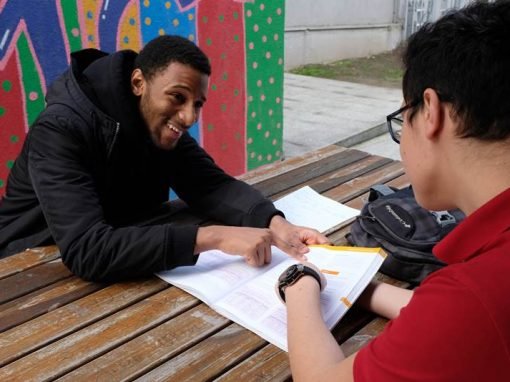Media Studies (9607)
Cambridge International AS and A Level Media Studies offers learners the chance to develop an understanding and appreciation of the place of media in our everyday lives. The syllabus enables learners to take a hands-on approach to the subject.
Through the coursework components – the Foundation Portfolio for AS Level and the Advanced Portfolio for A Level – they create their own media products from planning through to execution. Learners also consider and analyse examples from existing media, examining production processes and technologies and the effects they achieve.
Link to full Syllabus: https://www.cambridgeinternational.org/Images/502957-2021-2023-syllabus.pdf
Key Benefits
Cambridge International AS & A Level Media Studies is recognised by universities and employers as proof of knowledge and understanding of the media and its role in our daily lives. Learners develop a set of transferable skills, including the skill of thinking critically about mediated information, understanding its rhetorical qualities, and being aware of the significance of its conditions of production and reception. Learners will also be able to practise this skill to communicate their own ideas in a variety of forms. These skills can be applied across a wide range of subjects and equip learners well for progression to higher education or directly into employment.
Our approach in Cambridge International AS & A Level Media Studies encourages learners to be:
- confident, using theoretical approaches to decode media texts and contexts, and applying systematic procedures to understand audience behaviour
- responsible, challenging ideas about the nature of the media and their effects, considering the social, cultural and ethical dimensions
- reflective, developing an awareness of personal assumptions and being prepared to adopt alternative positions in order to make sense of these
- innovative, using creative strategies to communicate ideas, to tell stories and to demonstrate aesthetic awareness
- engaged, by adopting a critical stance in relation to the media and its products, while retaining an appreciation of the complex pleasures for audiences and users.
Key Concepts
Key concepts may open up new ways of thinking about, understanding or interpreting the important things to be learned.
The key concepts for Cambridge International AS & A Level Media Studies are:
- Language
How the media communicate meanings through their forms, codes, conventions and techniques.
- Representation
How the media construct the social world including the portrayal of ideas, individuals and groups.
- Industry
- How and why media texts are produced, distributed and circulated.
Audience
How audiences are constructed and addressed by media texts and how audiences interpret and respond to media texts.
Recognition and Progression
Cambridge Internationals expertise in curriculum, teaching and learning, and assessment is the basis for the recognition of the programmes and qualifications around the world. Every year thousands of students with Cambridge International AS & A Levels gain places at leading universities worldwide. They are valued by top universities around the world including those in the UK, US (including Ivy League universities), Europe, Australia, Canada and New Zealand.
UK NARIC, the national agency in the UK for the recognition and comparison of international qualifications and skills, has carried out an independent benchmarking study of Cambridge International AS & A Level and found it to be comparable to the standard of AS & A Level in the UK. This means students can be confident that their Cambridge International AS & A Level qualifications are accepted as equivalent, grade for grade, to UK AS & A Levels by leading universities worldwide.
Cambridge International AS Level Media Studies makes up the first half of the Cambridge International A Level course in Media Studies and provides a foundation for the study of Media Studies at Cambridge International A Level. Depending on local university entrance requirements, students may be able to use it to progress directly to university courses in Media Studies or some other subjects. It is also suitable as part of a course of general education.
Cambridge International A Level Media Studies provides a foundation for the study of Media Studies or related courses in higher education. Equally it is suitable as part of a course of general education.
Resources
The following are the preferred resources at Istanbul International School:
- Variety of resources determined by teacher
- Equipment for filming
- Editing Computer
Cambridge International Examinations
AS Level Candidates take:
Component 1
Foundation Portfolio – 50%
Candidates produce a media product that includes digital evidence of the process of their work and a creative critical reflection. Candidates work either individually or as part of a group to complete this coursework.
Internally assessed and externally moderated
Component 2
Media Texts and contexts – 50% (2 hours)
Section A: Media texts
Candidates answer one question based on an unseen moving image extract.
Section B: Media contexts
Candidates answer one question from a choice of two questions.
Externally assessed
A Level candidates take:
Component 1
Foundation Portfolio – 25%
Candidates produce a media product that includes digital evidence of the process of their work and a creative critical reflection. Candidates work either individually or as part of a group to complete this coursework.
Internally assessed and externally moderated
Component 2
Media Texts and contexts – 25% (2 hours)
Section A: Media texts
Candidates answer one question based on an unseen moving image extract.
Section B: Media contexts
Candidates answer one question from a choice of two questions.
Externally assessed
Component 3
Advanced Portfolio – 25%
Candidates produce a campaign of media products, digital evidence of the process of their work and reflect upon their finished products, in the form of an evaluative essay of around 1000 words. Candidates work either individually or as part of a group to complete this coursework.
Internally assessed and externally moderated
Component 4
Critical Perspectives – 25% (2 hours)
Section A: Media debates
Candidates answer two from a choice of three questions.
Section B: Media ecology
Candidates answer one question.
Externally assessed
SUBJECTS














